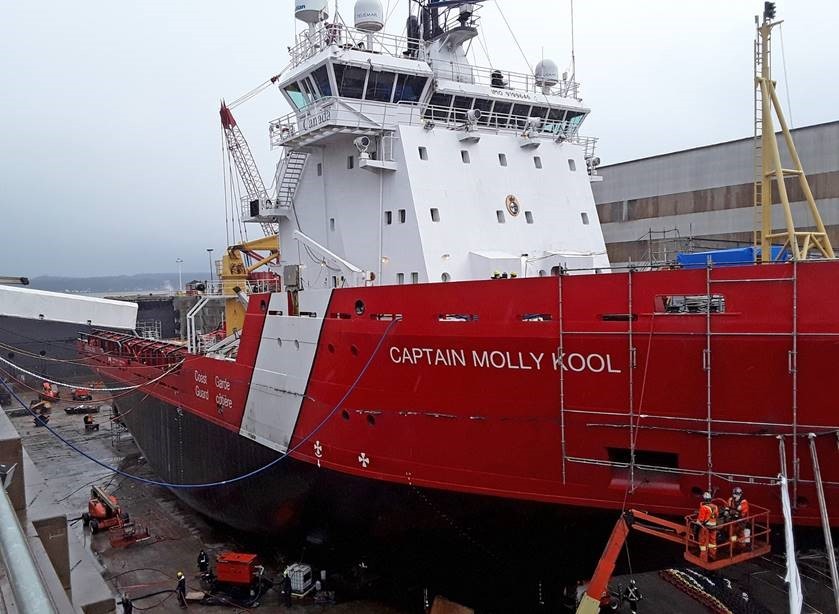
Through its icebreaking program, the Canadian Coast Guard supports safe marine traffic in and around ice-covered waters, provides aid to navigation, and ensures our waterways are safe and accessible for business year-round. Enhancing the capacity of our fleet and safely maintaining our vessels to be in reliable working condition are top priorities for the Coast Guard in order to support the critical work our members do to keep our waters safe and protect our marine and coastal environment.
Today, the Canadian Coast Guard Ship Captain Molly Kool has returned to service following the completion of a planned refit and maintenance work period at Davie Shipbuilding in Lévis, Quebec. The vessel will now transit to its homeport in St. John’s, Newfoundland, and prepare for the winter icebreaking season.
This planned refit and maintenance work was completed under the third pillar of the National Shipbuilding Strategy and will help ensure the CCGS Captain Molly Kool continues to deliver essential icebreaking services, keeping shipping routes open and safe while preventing ice jams and flooding. The ship is also equipped to provide emergency services such as search and rescue and environmental responses.
Through the National Shipbuilding Strategy, the Government of Canada is revitalizing and re-invigorating Canada’s marine industry, while also ensuring members of the Canadian Coast Guard have effective and modern equipment they need to continue serving Canadians proudly.
Additional multimedia
CCGS Captain Molly Kool preparing to depart Davie Shipyard following its refit and maintenance work.
Quotes
“The CCGS Captain Molly Kool is an integral part of the Coast Guard’s fleet all season long. In the winter she provides essential icebreaking measures to ensure continued trade operations in the St. Lawrence and Gulf, while fulfilling Arctic region resupply operations in the summer. The CCGS Captain Molly Kool keeps our vibrant Canadian economy running. Thank you to the workers at Davie Shipbuilding for the refit on this vessel, and to the crew members aboard CCGS Captain Molly Kool who will continue delivering crucial icebreaking services during this upcoming season.
The Honourable Bernadette Jordan, Minister of Fisheries, Oceans and the Canadian Coast Guard
Bon voyage CCGS Captain Molly Kool! We are proud of the work done by the Davie workers on this vessel which will continue to provide essential services to the Coast Guard. Icebreaking services are essential to keep shipping traffic moving and ports open throughout all four seasons in Canada. Thank you to the dedicated Davie employees and the Canadian Coast Guard crew for their important services.”
The Honourable Jean-Yves Duclos, President of the Treasury Board and Member of Parliament for Quebec
Quick facts
- The CCGS Captain Molly Kool, which entered into service in 2018, is the first of three medium interim icebreakers acquired to supplement the Coast Guard’s existing fleet during vessel life extension and repair periods and while new ships are being built.
- The work completed on the CCGS Captain Molly Kool included maintenance and inspection of the steering gear, replacement of the sea valves, regulatory inspections, and hull work.
- The CCGS Captain Molly Kool can maintain a speed of 3 knots through ice up to 1 metre thick. The vessel has a total of 18,278 horsepower and its twin propellers and twin rudders provide a high degree of manoeuvrability. The CCGS Captain Molly Kool can operate continuously without refueling for approximately 25 days, and has a crew of 19.
- In August 2018, the Government of Canada, on behalf of the Canadian Coast Guard, awarded Davie Shipbuilding a $610 million contract for the acquisition of three icebreakers and work to prepare the ships for service in the Canadian Coast Guard fleet. Two ships, the CCGS Captain Molly Kool and the CCGS Jean Goodwill have joined the CCG fleet, while the third, the CCGS Vincent Massey is expected to be delivered in early 2021.
- The National Shipbuilding Strategy is a long-term commitment to domestic shipbuilding that is not just about building ships; it is about revitalizing and re-invigorating a world-class marine industry that supports Canadian technological innovation and brings jobs and prosperity to many communities across the country.